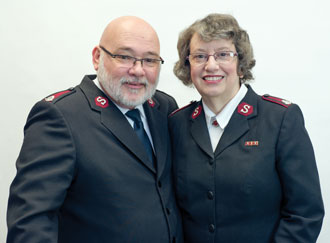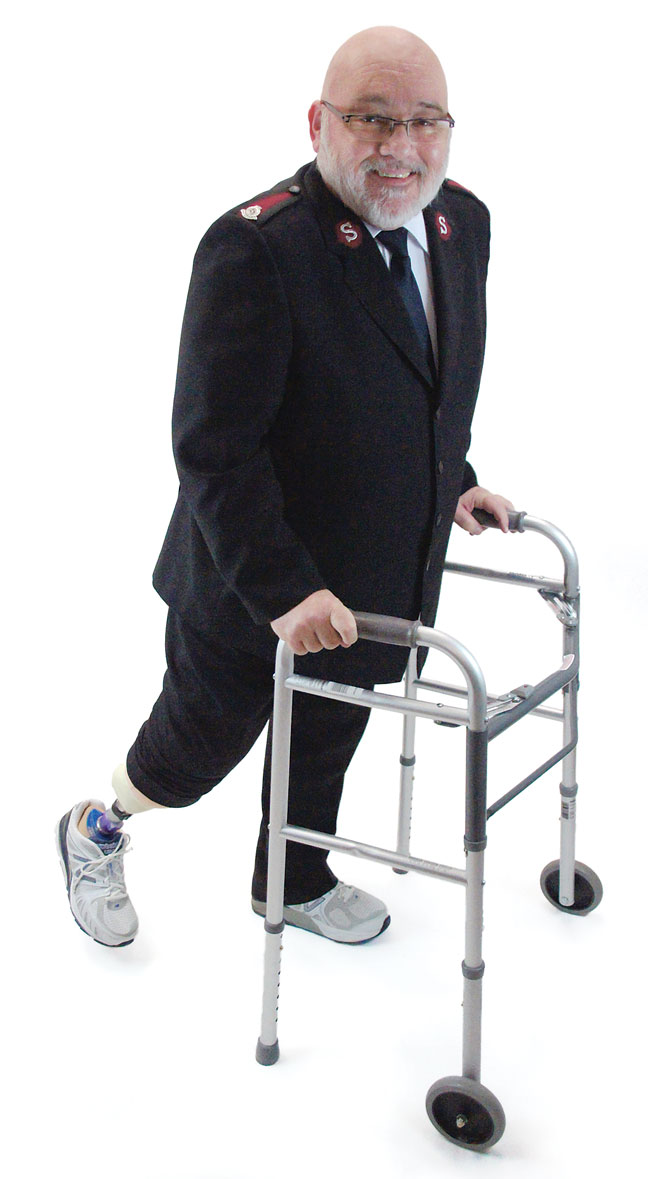“It's funny,” he says, “but everybody keeps saying how devastated I must be, and they're surprised when I reply, 'Well, no, not really.'
“God has walked alongside me through this journey. My faith has deepened, and life is good!”
From Symptom to Diagnosis
Major Tuppenney has lived with diabetes for 49 of his 61 years. Despite his best efforts, however, the big toe on his right foot needed to be amputated in 2003, while he was stationed in Detroit.
Eventually transferred to territorial headquarters in Toronto, and with the aid of an air boot that kept pressure off his foot, he was able to carry on with his duties as a social-services consultant.
But in October 2013, while at a substance-abuse conference in Ottawa, Major Tuppenney noticed a sore on his right heel. Despite attending to it promptly, it did not heal. Worse, another sore developed on the side of his foot near the site of the first amputation.
“It was a very small black mark but a lifetime of diabetes had taught me to be alert to the most minute of symptoms,” Major Tuppenney says. “I suspected they were diabetic ulcers, so I immediately phoned my wife, Pat, and told her I was heading home on the first available train.”
Sure enough, his podiatrist confirmed the major's diagnosis and immediately ordered him off his feet. Though they hoped they'd caught this early, specialists confirmed his worst fears. “Gangrene had taken total control of my foot.”
“When Is Enough, Enough?”
For the next three weeks, Major Tuppenney was on heavy antibiotics, and while the early days held hope, he took a turn for the worse.
Major Tuppenney's doctor booked him to see a vascular surgeon. During the course of the appointment, the surgeon told him, “We're going to try and save your leg.”
“That's when it hit me,” he says. “This wasn't just about my foot anymore; my entire leg was threatened.”
The surgeon recommended a vascular bypass, where healthy veins from Major Tuppenney's leg would be transplanted to increase blood flow to his foot. The operation was performed in November 2013, but by February 2014, things were back to where they had been. The surgeons then proposed an angioplasty, where stints were placed into the arteries in Major Tuppenney's leg to keep the veins open. The operation was successfully completed in March, but by July, his foot had once again gotten worse.
The doctors refused to admit defeat and suggested shaving off three quarters of his diseased heel. A specially made boot might enable him to walk.
 “Her love meant more to me than anything else,” says Major Tom Tuppenney of his wife, Pat (Photo: Timothy Cheng)
“Her love meant more to me than anything else,” says Major Tom Tuppenney of his wife, Pat (Photo: Timothy Cheng)
That was when Major Pat Tuppenney intervened.
“When is enough, enough?” she asked the doctors. She had watched her husband suffer silently but always in excruciating pain, yet matters were no better now than they'd been in October.
“That's your call, Tom,” the doctors replied. “We can save the foot, but we can't restore it to what it was—there's too much damage.”
Without hesitation, Major Tuppenney made his decision, “I've had enough. Take it off,” he said. “If there's no guarantee I'm ever going to be able to use this foot, schedule the amputation.”
Doubts and Fears
Now that the decision had been made, Major Tuppenney, in his straight-ahead fashion, wanted it done the next day. That couldn't happen, of course: too many procedures had to be put in place first—not that that was any consolation to the major.
“ 'Lord, let's get this thing off and let me get going,' I prayed. I'm impatient by nature. I want everything done yesterday!” Major Tuppenney laughs. “And it wasn't happening that way. I'm trusting God, except I'm not, really, because I'm questioning: Why isn't this happening faster?
“It was then I remembered: God isn't doing this to me. It's happening and God's with me through it all. I needed to listen to his voice. Some days, that was easy, and some days, not so.”
Surrounded by Love
But Major Tuppenney had support.
“Yorkminster Citadel, my church home, has been outstanding through all of this,” he says. “I remember one Sunday when I was in pain, almost more than I could bear.”
As he sat there, Major Heather Ballantine, the corps officer, announced, “Tom, I didn't mention this to you before, but you said you were willing for us to pray for you. I'd like you to come up to the front. Anyone who wants to come forward and pray for you can do so.”
“So I went up,” he continues. “All of a sudden, the songsters came down from the platform, then the band. Soon, I couldn't see for the crowd of people that were surrounding me with love. The members of the corps gave me support and encouragement.”
Major Tuppenney's main support was, of course, his wife and family. “Pat paid the price for the 16 months I was in that wheelchair,” he says. “Her love meant more to me than anything else. God's love was shown through her. I was—and am—blessed.”
But Major Tom Tuppenney was not just a passive spectator through all this.
“I'm first and foremost a Salvation Army officer,” he says. “And I'm very proud to wear my uniform. That uniform opens doors and I've had many opportunities to witness to people because of it. Doctors and fellow patients alike would come to me and say, 'You have such a good attitude, you're not angry or upset. Why?' I'd reply, 'This is a challenge, but God's walking me through this. I don't know what's at the end of this journey but God's with me and that's what counts.' ”
The Power of God
After weeks of waiting, the date of the operation approached on January 16. The surgeon came to see Major Tuppenney before the operation.
“OK, Tom,” he said, “we're going to go through the knee. If I can go lower, I will, but there's always an outside chance we may have to go higher, and in the end, there is no guarantee that I won't end up with that leg off.”
Major Tuppenney was fine with that. “It's not going to make any difference,” he told his wife. “I'll get through it just fine.” He knew God was with him.
“You haven't let me down so far,” he prayed, “and I know you're not going to let me down now. I'm just asking you to be there.”
When Major Tuppenney woke up in the recovery room, the first person he saw was his surgeon, beaming from ear to ear.
“It worked,” the surgeon said simply.
“I just lay there and cried,” says Major Tuppenney. “Talk about the power of God in your life.”
Giving Him Control
Now learning to walk again with the aid of a prosthesis, Major Tuppenney is hoping to return to work.
“My goal has always been to return to normal life—or as normal as it can possibly be for me!” he laughs.
“Am I anxious about what's going on? Absolutely!” he continues. “But I'm not angry about the amputation—I'm quite at peace with that. It was either have a foot that was never going to do me any good or get it cut off so I can get my life back. Part of my leg and foot coming off has not ended my life. In fact, I look at my prosthetic device as a part of me now—it's just part of the journey that I'm on with God.
“I don't know what's going to happen tomorrow or next week or in six months from now, but God's going to work this out and I've got to give him control.”










Comment
On Tuesday, March 13, 2018, Faith Vardon said:
On Wednesday, May 27, 2015, Connie Knighton said:
And He said to me, “My grace is sufficient for you, for My strength is made perfect in weakness.” Therefore most gladly I will rather boast in my infirmities, that the power of Christ may rest upon me. Tom, you live this out and witness to us of the truth of God's word.
Leave a Comment